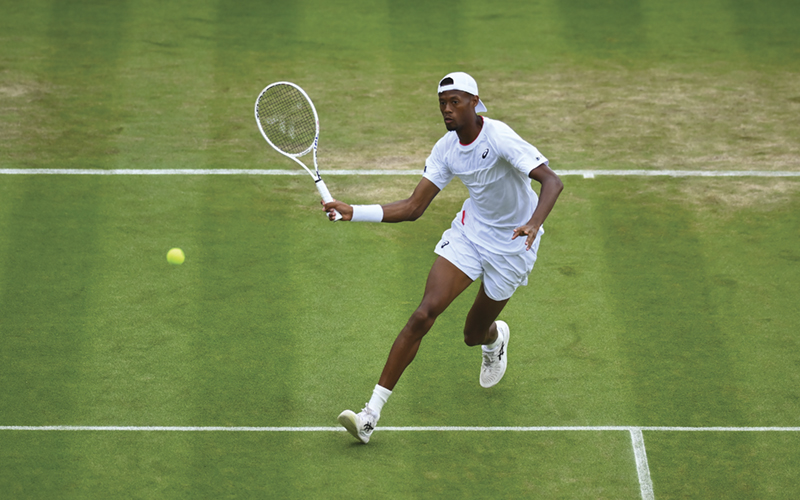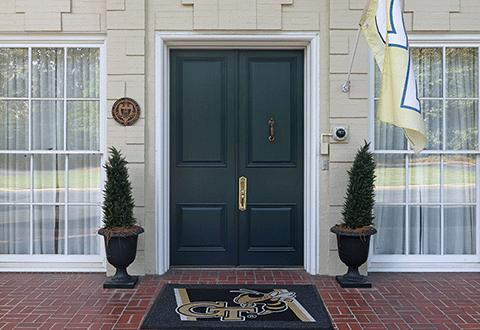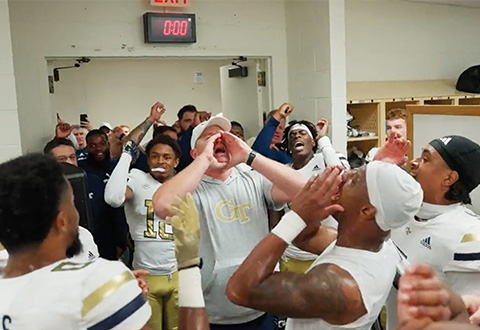Pardon Me While I Step Onto Something Less Comfortable
By: By Shelley Wunder-Smith, Photography Corinne Dubreuil | Categories: Featured Stories

Going into the All-England Championships, Eubanks, Cls 18, was ranked 77th and had won only one ATP Tour title—Mallorca, right before. He had never progressed beyond the second round of a major tournament. And he despised playing on grass.
It made the former star Georgia Tech tennis player—the first Yellow Jacket ever to twice earn ACC Player of the Year and a three-time All-ACC honoree—profoundly uncomfortable. In fact, at the beginning of the five-week grass season which culminates with Wimbledon, Eubanks texted friend and Hall of Famer Kim Clijsters griping about “the stupidest surface to play tennis on.”
“Look, no one likes to play on grass. It’s a challenging surface, and your footwork, your movement, has to change. I think Chris worried about that, particularly because of his height [Eubanks is 6'7"]. That said, he has a powerful game, and he should be dangerous on grass,” says Byers Men’s Tennis Head Coach Kenny Thorne, IE 89.
“For instance, Chris’ forehand is fast and heavy,” Thorne continues. “If he hits a solid forehand into a corner, and his opponent gets over there, on a hard court they could plant their foot, hit and get back in the game, but on grass they can’t recover quite as well because the footing’s slippery. Grass takes you longer to recover.”
Grass is the fastest surface in tennis. It’s particularly tricky because balls have a lower bounce; additionally, if the grass is damp, balls will spin off it even more quickly. It’s a surface that rewards forceful styles of play.
Given his performance at Wimbledon, the only Grand Slam tournament played on grass, Eubanks clearly approached his game, and the surface, differently. (Afterward Eubanks admitted he didn’t let himself think too far ahead, only extending his hotel stay as he’d won another match.)
He pulled off win after win: Brazil’s Thiago Monteiro; Britain’s 2022 semifinalist and No. 132-ranked Cameron Norrie; Australia’s Chris O’Connell; and then finally, in five sets, No. 5-seed Stefanos Tsitsipas, to gain the quarterfinals.
While Eubanks lost his Wimbledon quarterfinal, he had pushed No. 3-ranked Daniil Medvedev to five sets. As he walked off the court, the crowd gave him an extended standing ovation.
He played next in his hometown at the Atlanta Open, where he received a hero’s welcome. In the first round, he beat Andres Martin, a fellow Yellow Jacket and current student, but ultimately lost again in the quarterfinals. Eubanks entered the U.S. Open in August as the 28th seed, ranked 30th in the world. He won his first round, but then had a frustrating loss in the second round against French wildcard Benjamin Bonzi.
When asked about discomfort as a factor in his game psychology and strategy, Eubanks says, “That’s a huge part of it—understanding, especially on the first few weeks of grass season, that no one feels comfortable on it and you just have to work through it. The movements are so different, and it takes a bit of time to really find your footing. And then realizing, hey—if no one feels comfortable on grass, are there ways I can disrupt my opponent’s rhythm a little more than my own?”
“When I started to experience more success on grass, I started to feel much more comfortable on it. My mindset began to shift, and I could see elements in my game that could be beneficial on grass,” Eubanks says.
He has clearly arrived at a new level of play—and consequently, success. After Wimbledon, Eubanks even called grass his “best friend,” which would once have been unthinkable.
“That says a lot about who he is—a person being comfortable in uncomfortable positions,” says Thorne. “And that’s Georgia Tech. That’s exactly what our students get out of being a student here, which they may not even realize: When you leave the Institute, you’re probably the most comfortable person in the room with being uncomfortable.”
That’s a real feat, and not just an athletic one.


